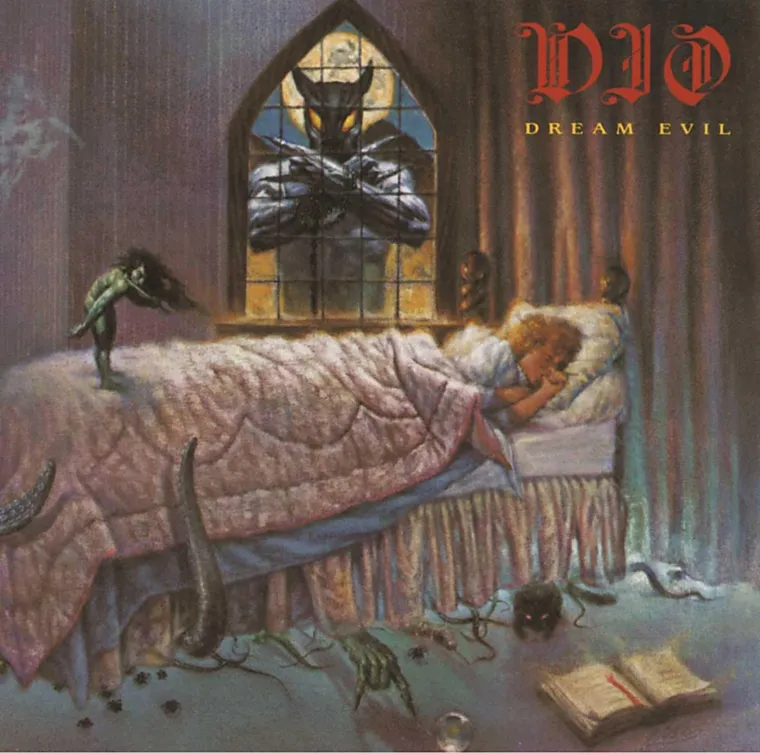Released on July 21, 1987, Dream Evil is the fourth studio album by Dio—and it marks a triumphant return to fantasy-laced, full-throttle heavy metal. Dark, melodic, and defiantly theatrical, it’s an album that plays like a metal fairy tale forged in fire and lightning.
Where 1985’s Sacred Heart leaned more into synths and a polished sheen, Dream Evil strikes a better balance. This is Dio embracing both the mystical grandeur and ferocious energy that defined the early albums, while showcasing a band that had grown tighter, darker, and more confident in its identity.
And while the late ’80s saw many metal acts softening their edges for mainstream exposure, Dio doubled down on his roots. He didn’t chase trends—he conjured his own world. Dream Evil is Dio refined: soaring vocals, pounding rhythms, and epic, evocative songwriting drenched in atmosphere and attitude.
Moonlight and Fire: The Journey Begins
The album wastes no time. “Night People” kicks things off with snarling guitars and a galloping rhythm section—Ronnie James Dio howling with charismatic menace. It’s aggressive, gritty, and instantly commanding. Craig Goldy’s riffs strike hard, while Vinny Appice's drumming thunders underneath with precision. This is Dio, not just returning—but charging forward.
Then comes the title track, Dream Evil, and the tone shifts to the mystical. Anchored by an eerie guitar intro and a chorus built for arena-wide chants, it’s classic Dio—fantasy metaphors wrapped around very real emotions. The production is huge, giving Dio’s voice room to soar while Goldy layers melodic guitar textures that evoke dragons, shadows, and distant battles.
“Sunset Superman” brings the tempo back up and unleashes one of the most anthemic grooves on the album. Goldy’s riffs swerve between hard rock hooks and metal muscle, while Dio belts with fierce conviction. It’s a power track—anthemic without being cheesy, catchy without compromising the album’s darker tone.
“All the Fools Sailed Away” is a mid-album standout. Slow-building and cinematic, it weaves haunting melodies with emotionally heavy lyrics. The song explores themes of disillusionment and blind faith, elevated by Dio’s soul-stirring performance. Clocking in at over seven minutes, it’s a journey—and one of the band’s most underrated epics.
Dark Dreams and Dangerous Hooks: Dio’s Realm Expands
The second half of the album delivers with equal strength. “Naked in the Rain” combines heavy riffing with a slow, grinding pace and slightly psychedelic undertones. The chorus is hypnotic and sinister, with Dio once again walking the line between mystic storytelling and real-world commentary.
“Overlove” is a speed demon—short, sharp, and full of attitude. Here, Dio trades some of his usual grandiosity for raw power and swagger. It’s a fun, furious injection of energy that keeps the album from becoming too weighty.
“I Could Have Been a Dreamer” is the album’s most accessible track—and for good reason. With a huge, radio-friendly chorus and a theme of lost ambition, it’s both a ballad and a battle cry. Dio sounds vulnerable and victorious all at once, proving his emotional range without losing an ounce of power.
“Faces in the Window” and the closing track, “When a Woman Cries,” round out the album with heavy mid-tempo crunch and melodic drama. The former feels like a horror story set to music, while the latter tackles emotional pain through Dio’s trademark lens of metaphor and myth. It’s a slightly downbeat end, but one that lingers long after the final note.
Legacy Weapons: Performance and Production
Ronnie James Dio remains one of the most commanding voices in metal history—and Dream Evil is further proof. His vocals are rich with character, moving effortlessly between snarls, screams, and soulful melodies. Whether singing about demons or disillusionment, every word carries weight.
Craig Goldy, stepping into shoes once filled by Vivian Campbell, proves himself with authority. His playing is versatile—both aggressive and expressive. His solos are tasteful and often atmospheric, and he knows when to shred and when to let a riff breathe. While not as flashy as Campbell, Goldy brings a more brooding, emotional tone that fits Dream Evil’s mood perfectly.
Vinny Appice and Jimmy Bain form the rock-solid rhythm section. Appice's drumming is deliberate and forceful, while Bain's bass work remains a foundational presence throughout. Together, they give the album its driving momentum.
Produced by Ronnie himself alongside engineers Angelo Arcuri and Tony Platt, the album sounds massive. The mix is lush and full, with every instrument sitting just right. It avoids the overprocessed pitfalls of the era while still sounding big enough for stadiums.
Final Verdict: 9/10
Dream Evil is a powerful entry in the Dio catalog—less well-known than Holy Diver or The Last in Line, but just as worthy. It’s the sound of a metal legend refining his craft, bringing together fantasy and fury in equal measure. With an underrated lineup, a darkly charismatic tone, and no shortage of killer songs, Dream Evil is a gem of late-’80s metal.
Decades later, the album still casts a spell. From the gothic grandeur of “All the Fools Sailed Away” to the infectious defiance of “I Could Have Been a Dreamer,” this is Dio doing what he does best: building castles in the clouds, then setting them ablaze with sound.
Standout Tracks
Dream Evil—haunting, melodic, and unmistakably Dio
Sunset Superman—thunderous groove and anthemic fire
All the Fools Sailed Away—cinematic and emotionally epic
I Could Have Been a Dreamer—a melodic, heartfelt anthem
Night People—dark, fast, and attention-grabbing
Overlove—aggressive, fast-paced adrenaline
Faces in the Window—eerie, atmospheric metal storytelling

